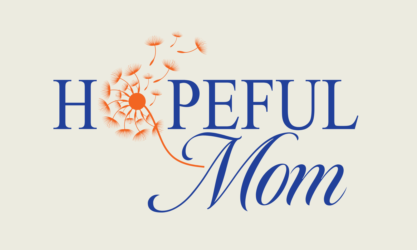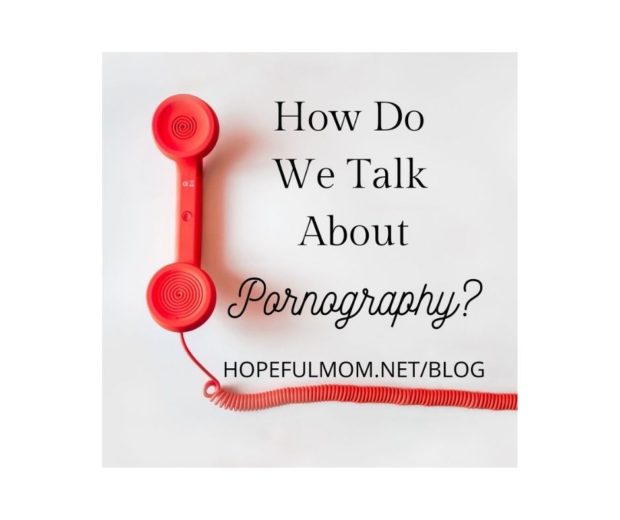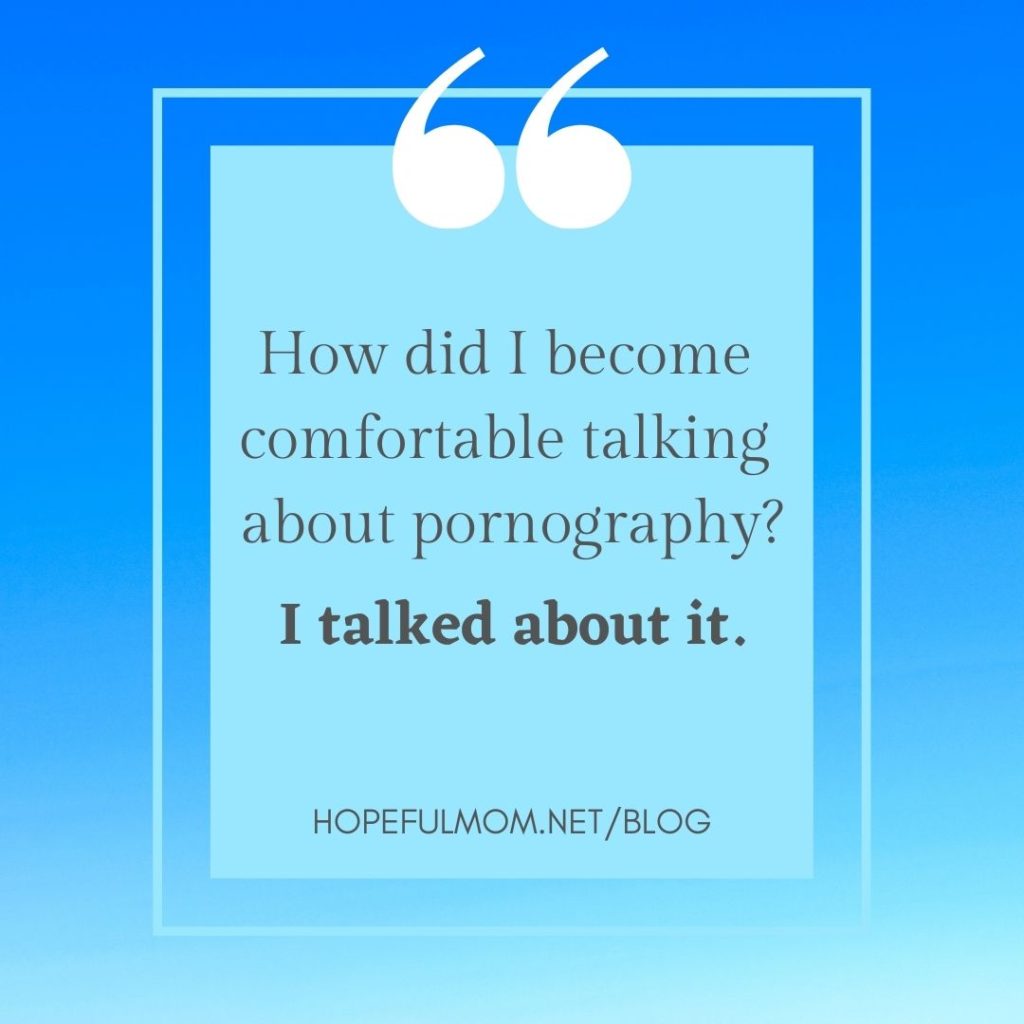Until a few years ago, I almost never used the word “pornography” or “porn.” When I found myself needing to refer to it, I whispered and practically choked on the word as it exited my mouth. I didn’t want to talk about pornography.
If I needed to refer to pornographic images, I said “inappropriate pictures” and assumed those around me knew what I meant. Even then, I typically lowered my voice, spoke to the ground, and blushed. I found it uncomfortable.
I wouldn’t say I’m a prude. I was your average filthy-mouthed teenager. But I’ve put a few years behind me since then, and I view the use of cuss words as unnecessary and crass. Not to say these are profane words, but I used to rate them at the same level.
When my son first said, “I was watching porn,” it was weird. I didn’t know he knew the word, and besides all the other emotions I experienced, his vernacular confounded me. It was more than odd my teenager was uttering the word “porn,” especially to me.
Awkward!
So how do we get passed the awkwardness? How do we add these words into our vocabulary so we can talk about pornography casually and easily—with our children, with our friends, and with our neighbors?
Last year, I started teaching with a non-profit organization. I educate students at local schools about making healthy choices and avoiding risky behaviors, one of which is sexual activity. It took me a minute to find my groove. The first few times I referred to sex in my presentation, I was noticeably embarrassed. Then I swung the other direction, boldly and bravely attempting to imitate my younger co-workers. I threw the word around with some attitude, like I was cool. But the kids saw through that smokescreen. One girl wrinkled her nose as I stated that sex within marriage is more fulfilling than outside of marriage. I don’t think she expected a perceived-as-old lady to talk about sex in that manner. But I think my swagger seemed more out of place than the information I was disseminating.
However, the more I talked about sexual activity, the more comfortable I became with the terms and explanations. I no longer squirm when referring to sexual activity, nor do I act like a youngster. I’m me. I’m guessing the students see me more as a mother figure than the big sister type. And I’m good with that.
Inevitably, the first time one of us mentions pornography in the classroom, the students snicker. I expect the laughter now and ignore the reactions or lean into them, pausing a moment, allowing them to absorb the word and realize that, yes, she just went there.
So, how did I become comfortable talking about pornography? I talked about it.
At some point, I realized talking about pornography and its harms was more important than being comfortable, which equaled staying quiet. I stepped out of my comfort zone, opened my mouth, and said the word—awkwardly at first. I even practiced saying “pornography” out loud to myself so it became more natural. Then I began.
The Conversations
I first had to talk about pornography with my son, the one who confessed. We had several conversations in which we stuttered, turned our heads away from each other, shuffled from one foot to the other, and sweated through it. I even stated the obvious, “I know this is a difficult conversation, but it’s important. I know I’m not doing a great job at this, but I want to be here for you.”
Then I branched out to my other children. I was direct with the older ones. I asked if they had seen pornography and let the conversation develop from there.
Eventually I could talk about pornography with my friends and neighbors. I was careful not to disclose personal information but managed to introduce the topic as something I had read about or was concerned about.
Here are some tips to help you talk about pornography:
- Practice saying the word “pornography” and related words out loud. I know it sounds corny, but it helps you become more comfortable with the terminology.
- Have regular conversations with your child(ren). Whether they struggle with pornography or not, talk about it openly and frequently, starting at a young age. Interject the conversation while engaged in another activity or at the dinner table. The objective is for our kiddos to see it as a normal topic.
- Share information as you learn. For example, if you watch a YouTube video about the brain and pornography, send a link to your children and others.
- Don’t give up—even if you feel like you are talking to a brick wall. Your kiddos may not respond well. That’s okay. Your friends may look at you as if you are speaking a foreign language. That’s okay. Your neighbor may walk away from the conversation. That’s okay. Your social media post may not receive any likes. That’s okay. Keep trying.
Do you have a success story, or a not so successful story, related to talking about pornography? Do you have any suggestions as to how to talk about pornography with our children, friends, or neighbors? Are there others you would like to talk with about this important topic? Please comment on this post or send me a personal message. We’d love to hear from you.
Please share this post on your social media and subscribe to receive updates and a FREE resource.
About the author
Barb Winters is the author of Sexpectations: Helping the Next Generation Navigate Healthy Relationships and founder of Hopeful Mom. She’s a certified mental health coach and offers one-on-one consultations for parents. For more about Barb, click "About" in the menu.





3 Replies to “How Do We Talk About Pornography?”